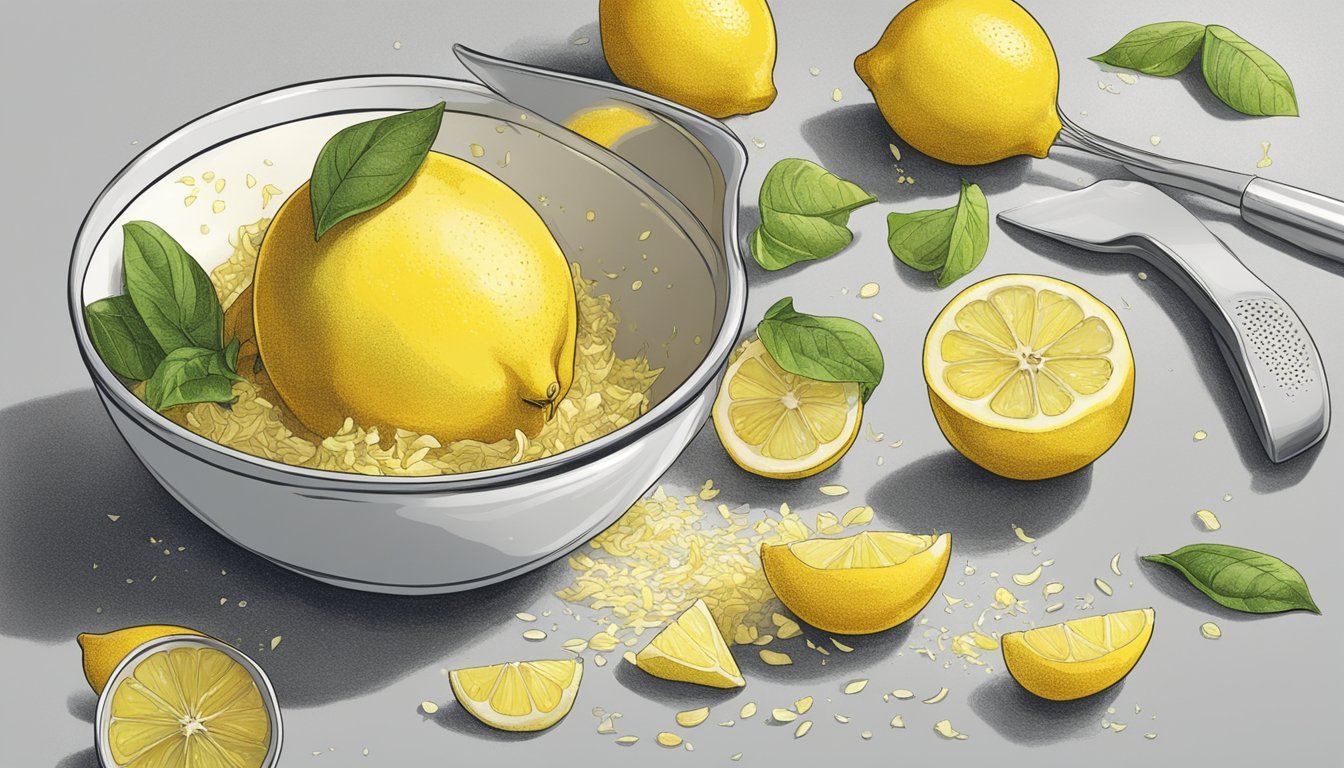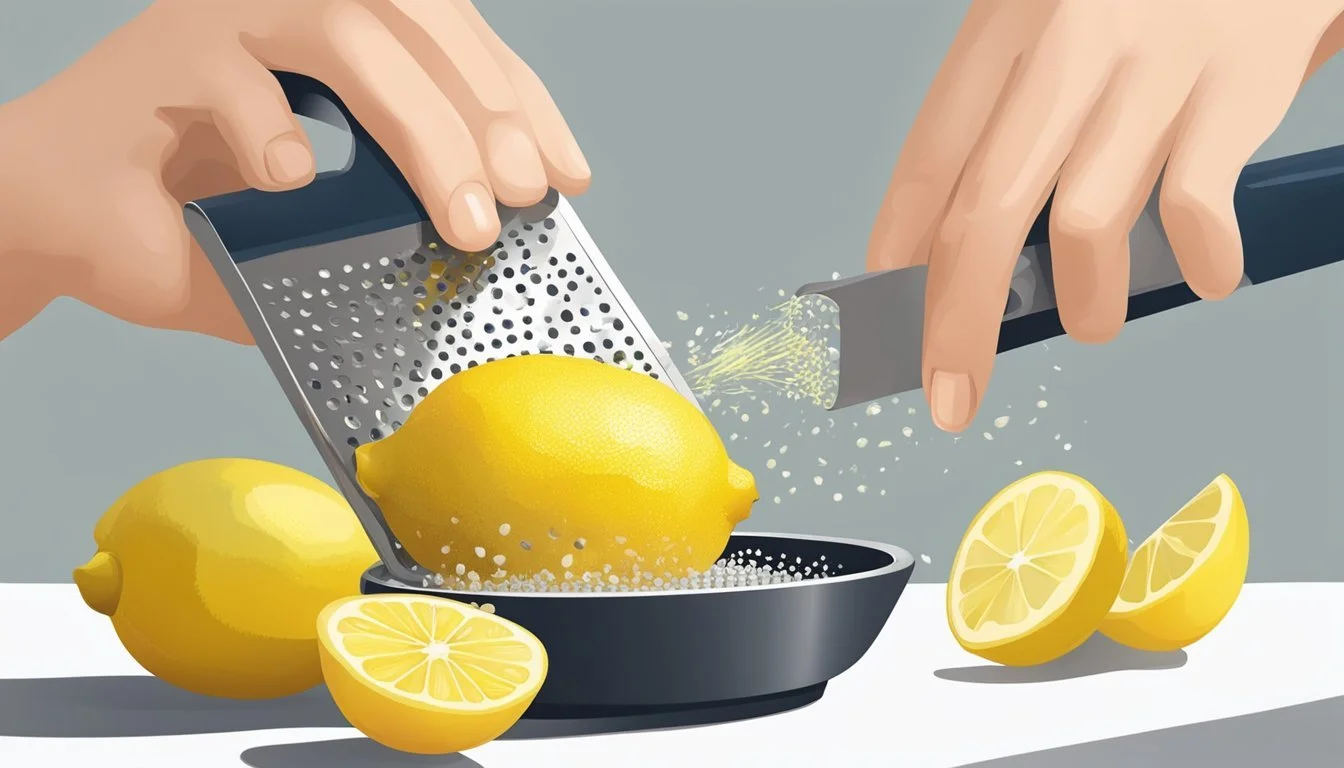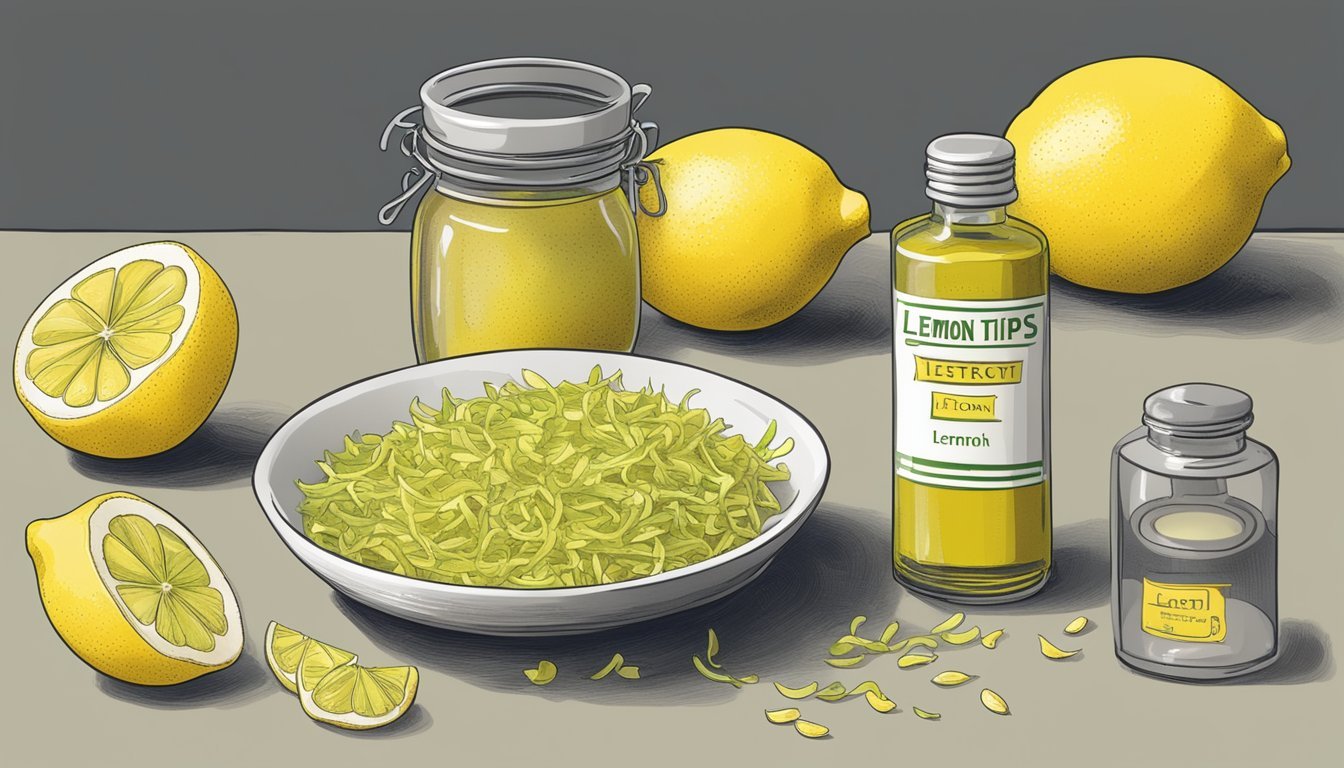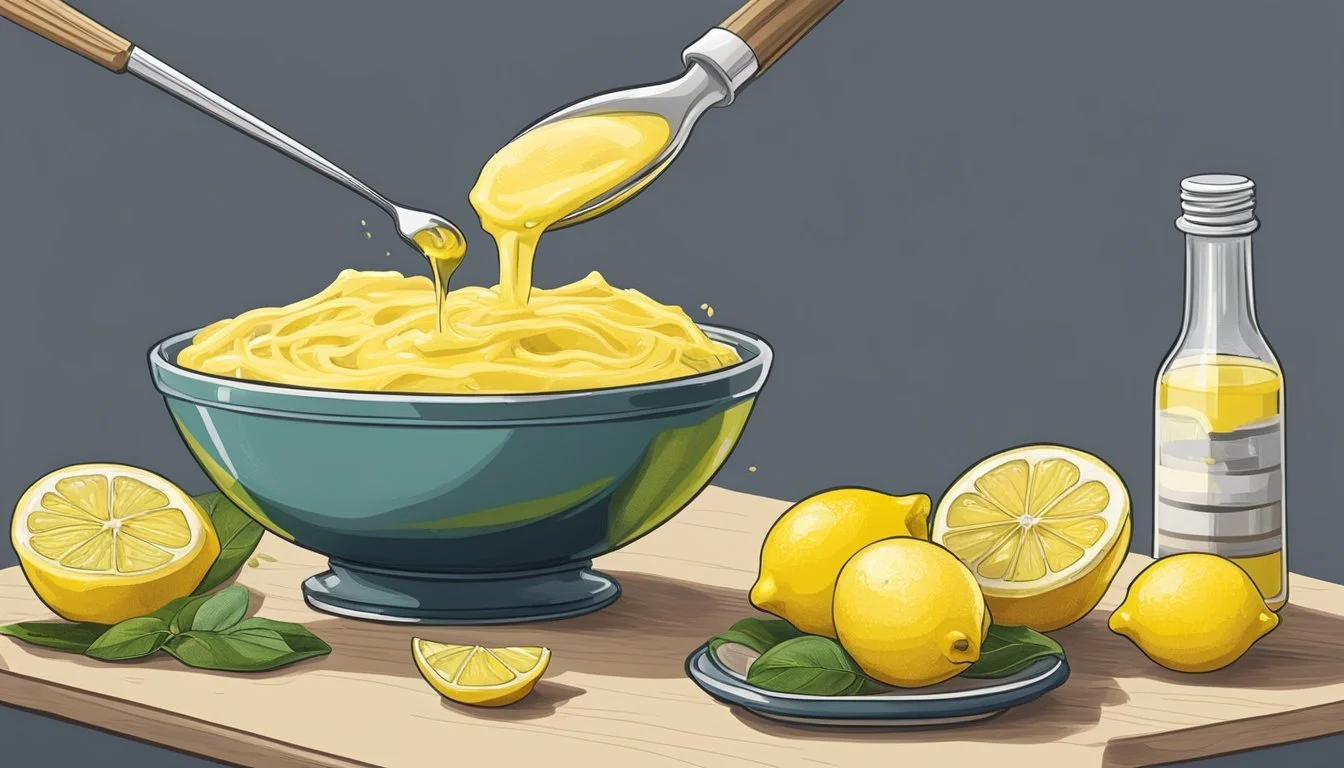How to Substitute Lemon Zest for Lemon Extract
A Simple Conversion Guide
When a recipe calls for lemon zest and you find yourself without, there are several ways to achieve a similar citrus flavor using lemon extract. Lemon zest, the grated outer rind of the lemon, imparts a bright, zesty flavor to both baking and cooking. Its unique flavor profile comes from the lemon's oils, which are most concentrated in the rind. However, when fresh lemons are not available, lemon extract, a more concentrated form of lemon flavor, can be used with some adjustments.
Using lemon extract as a substitute requires understanding the potency difference between the zest and the extract. Lemon extract is made by soaking lemon rind in alcohol to infuse the liquid with lemon flavor and is much stronger than fresh zest. Consequently, recipes typically call for a smaller amount of extract than zest. For an effective substitution, it is essential not to overdo the quantity of lemon extract; otherwise, it can overpower the other flavors in the dish.
In recipes where lemon zest is used for more than just flavor, such as providing texture or a burst of color, lemon extract will not serve as a direct replacement. It is important to consider the role lemon zest plays in the finished product, since extract will not provide the same visual or textural effect. When using lemon extract as a substitute in baking and cooking, it's crucial to maintain the intended flavor balance while acknowledging the differences in form and intensity between zest and extract.
Understanding Lemon Zest and Lemon Extract
When substituting lemon zest for lemon extract, it is crucial to understand their distinct properties and how they contribute to the flavor of a dish.
Defining Lemon Zest
Lemon zest is the outermost layer of the lemon's rind, which is colored bright yellow and contains high concentrations of essential oils. It adds a vibrant, citrusy flavor to recipes. To obtain lemon zest, one usually grates the rind of the lemon, avoiding the bitter white pith beneath.
Defining Lemon Extract
Lemon extract, on the other hand, is a more concentrated flavoring that comes from soaking the lemon peel in an alcohol base. This process effectively distills the essential oils and imparts a strong lemon flavor to the extract. Typically used in small quantities, lemon extract can provide a potent lemon essence to various dishes and baked goods.
Chemical Components and Flavor Contributions
Lemon Zest:
Essential oils: Primarily composed of limonene, which contributes to the fresh lemon scent and taste.
Flavor: Provides a fresh, tangy, and bright flavor from the natural oils present in the zest.
Lemon Extract:
Concentrated: The distillation process results in a highly concentrated form of lemon flavor.
Alcohol base: Acts as a preservative and carrier for the essential oils, enabling the extract to infuse a robust flavor even in small amounts.
Both lemon zest and lemon extract play vital roles in culinary applications, with zest imparting a fresh, aromatic citrus quality, while extract offers a powerful and lasting lemon essence.
The Role of Lemon Zest in Recipes
Lemon zest plays a pivotal role in culinary creations, adding a distinct citrus flavor and contributing to the overall texture and consistency of dishes. It is an integral component for both sweet and savory recipes, enhancing the flavor profile with its tang and aroma.
Impact on Texture and Consistency
Lemon zest, when added to recipes, contributes negligible moisture, preserving the desired texture and consistency. Unlike liquid extracts, it doesn't risk altering the delicate balance of ingredients. In desserts and baked goods, where precision is vital, this ensures the structure and crumb remain unchanged.
Flavor Enhancement in Savory and Sweet Dishes
The citrus flavor of lemon zest is unmatched, providing a bright tang that complements a variety of dishes. Its aromatic oils enhance the flavor profile of sweets without overpowering them, and in savory recipes, it adds a fresh zing that can lift and balance the dish. The zest contains the fruit's essential oils, which carry the intense lemon aroma and taste, crucial for flavoring.
Culinary Uses Beyond Flavoring
Besides flavoring, lemon zest serves several other culinary purposes. It acts as a garnishing agent, adding color and zest to plates. It can also be an integral part of spice rubs and marinades, infusing depth and a nuanced aroma. The zest's versatility makes it a celebrated favorite in the culinary world for its multiple uses in elevating the sensory qualities of various recipes.
Substituting Lemon Zest for Lemon Extract
When replacing lemon extract with lemon zest in recipes, understanding the correct ratios, acidity levels, and intensity of flavor is crucial. This section outlines the specifics required to achieve the desired outcome.
Converting Measurements for Substitution
To accurately substitute lemon zest for lemon extract, it's essential to use the proper conversion ratio. Typically, 1 teaspoon of lemon zest can replace 1 tablespoon of lemon extract. This is because the extract is more concentrated than zest.
Conversion Table:
Lemon Extract Lemon Zest Substitute 1 tablespoon 1 teaspoon 2 tablespoons 2 teaspoons 3 tablespoons 3 teaspoons (1 tablespoon)
Considering Acidity and Flavor Intensity
Lemon extract is often alcohol-based and provides a bold lemon flavor without the tart acidity of lemon juice. On the other hand, lemon zest contains the natural oils of the lemon peel, offering a fresh and aromatic citrus flavor. When substituting lemon zest for extract, one should note that the zest lacks the alcohol content, which may slightly affect the recipe's flavor profile.
Best Practices for Substitution in Baking
In baking recipes, it's important to maintain the balance of dry and wet ingredients. Substituting lemon zest, a dry ingredient, for a liquid extract requires no additional adjustments. However, the potency of flavor can vary. Using the zest from oranges, limes, or other citrus fruits is an acceptable alternative if lemon zest is not available, keeping in mind that each zest carries its unique flavor notes and potency.
For the best results:
Ensure zest is finely grated to avoid altering the texture.
Add zest early on to release its oils and maximize flavor.
Consider the overall flavor balance; adjust the quantity of zest to taste.
Alternative Lemon Flavor Substitutes
When substituting lemon zest in recipes, one can explore various citrus-based options or even venture into non-citrus alternatives to achieve a similar flavor profile.
Using Citrus Juices and Other Zests
Lemon Juice: It's typically used in a higher quantity compared to zest to achieve the desired flavor. For instance, replace 1 teaspoon of lemon zest with 2 teaspoons of fresh lemon juice.
Lime Juice: This can impart a tart, tropical note. Use an equal amount of lime zest in place of lemon zest for a similar zesty flavor.
Orange Juice: While milder, it can provide a sweet citrus flavor. Use a ratio of 1:1 when substituting with orange zest.
Exploring Bottled Citrus Extracts and Oils
Citrus Extracts
Lemon Extract: A concentrated flavoring used in smaller amounts; generally, substitute 1 teaspoon of lemon extract with 2 teaspoons of lemon zest.
Lime and Orange Extracts: Similarly potent as lemon, used in equal ratios as their zest counterparts.
Citrus Oils
Lemon Oil: Typically more concentrated than extracts; a smaller quantity is needed, about ½ teaspoon of lemon oil for every teaspoon of zest.
Non-Citrus Substitutes
Some recipes may be compatible with non-citrus flavors that mimic the brightness of lemon zest.
Vinegar: A splash of vinegar can add acidity. Use it sparingly as its flavor is distinct.
Vanilla Extract: In sweet dishes, vanilla can offer a complementary aromatic sweetness. Use an equal amount in replacement of the zest or to taste.
Practical Tips for Storing Lemon Zest and Substitutes
Storing lemon zest and its substitutes correctly is essential for maintaining their potency and flavor profile. Following the proper storage methods can make a significant difference in the quality and shelf life of these ingredients.
Preserving Fresh Lemon Zest
For fresh lemon zest, it’s vital to keep it dry and cold to retain its vibrant flavor. One can either:
Store in the fridge: Place fresh lemon zest in a small, airtight container or resealable plastic bag and keep it in the refrigerator for up to a week.
Freeze: For longer storage, spread the zest on a baking sheet lined with parchment, freeze until solid, and then transfer to an airtight container or freezer bag. It will keep well for several months, up to six, and can be used directly from the freezer.
Shelf Life of Common Substitutes
Substitutes for lemon zest such as dried lemon peel and bottled lemon juice have different storage requirements.
Dried Lemon Peel:
Pantry: Keep in a cool, dark place in a tightly sealed container. It maintains its quality for up to three years.
Usage Tip: Because its flavor is more concentrated, use one-third less dried lemon peel than fresh zest.
Bottled Lemon Juice:
Fridge: Once opened, store it in the refrigerator and use within 6 months for the best flavor.
Remember: The taste is not as complex as zest, and it adds liquid to the dish, which may need adjusting in recipes.
By adhering to these storage guidelines, one can ensure that the lemon zest and its substitutes are at their best when required for cooking or baking.
Recipe Adjustments When Using Lemon Zest Substitutes
Substituting lemon zest with lemon extract requires careful measurement adjustments to maintain the integrity of the flavor without overwhelming the dish.
Modifying Desserts and Sweet Baked Goods
When baking cakes, cookies, or creating lemon bars, the vibrant citrus note is key. Lemon extract is potent, so it's essential to use just half a teaspoon of extract for every tablespoon of lemon zest needed. Here's a quick guide for reference:
Lemon Meringue Pie: For the zest of 1 lemon, use just ¼ teaspoon of lemon extract.
Custard or Sweets: Add the extract gradually, taste-testing to avoid overpowering the dish.
Pastry & Desserts: Incorporate the extract with other wet ingredients to ensure even distribution.
The acidity in lemon extract can react with ingredients like baking soda, so it's crucial to balance the recipe to prevent desserts from falling flat or curdling.
Adjustments for Savory Dishes and Dressings
Lemon zest often adds a fresh, aromatic quality to savory dishes, salad dressings, and savory marinades. When replacing zest with extract:
Start with a small amount; mix in a quarter teaspoon of lemon extract per tablespoon of zest.
For dressings and marinades: Combine the extract with the oil or liquid base first for even flavor distribution.
Lemon extract's concentration means that its addition should be tempered to complement rather than dominate the other ingredients.
Closing Thoughts on Lemon Flavor in Cooking and Baking
Lemon flavor is an integral component in both cooking and baking, offering a bright, tangy element that can lift and enhance the overall taste of a dish. When dealing directly with lemons, zesting a lemon provides that intense lemon essence many chefs and bakers seek. The grated lemon peel contains the natural oils that harbor the pure lemon flavor, making it a prime choice for infusing dishes with a vivid citrus burst.
In the realm of baking, lemon zest contributes a fresh, zesty note to baked goods without the addition of liquid, which can alter the consistency of dough and batter. Its versatility allows it to pair well with an array of other flavors, creating a flavor match made in heaven for items like lemon pound cake, cookies, or lemon glaze.
For a more concentrated lemon flavor without moisture, bakers may reach for lemon extract. However, if they are in possession of a larger amount of lemon zest, it can be used to successfully mimic the intense profile of the extract. They should be mindful that while the zest does offer the pure taste of the fruit, it does not chemically match the composition of an extract.
In culinary applications such as marinades and sauces, lemon zest does more than just infuse flavor; it acts as a fragrant, edible garnish that complements the visual appeal of a dish. One should remember that cooking with zest requires a deft hand, as a little goes a long way due to its concentrated nature.
Table: Lemon Zest in Place of Lemon Extract
Dish Type Lemon Extract Lemon Zest Replacement Baked Goods 1 teaspoon 2 tablespoons grated lemon peel Marinades 1 tablespoon 2 tablespoons finely minced zest
Ultimately, whether a recipe calls for a bold or subtle lemon note, there are numerous ways to achieve the desired citrus effect. While lemon zest and extract both deliver citrus fruit flavors, they each bring something unique to the table and should be used with consideration of the texture and balance of the final product.








